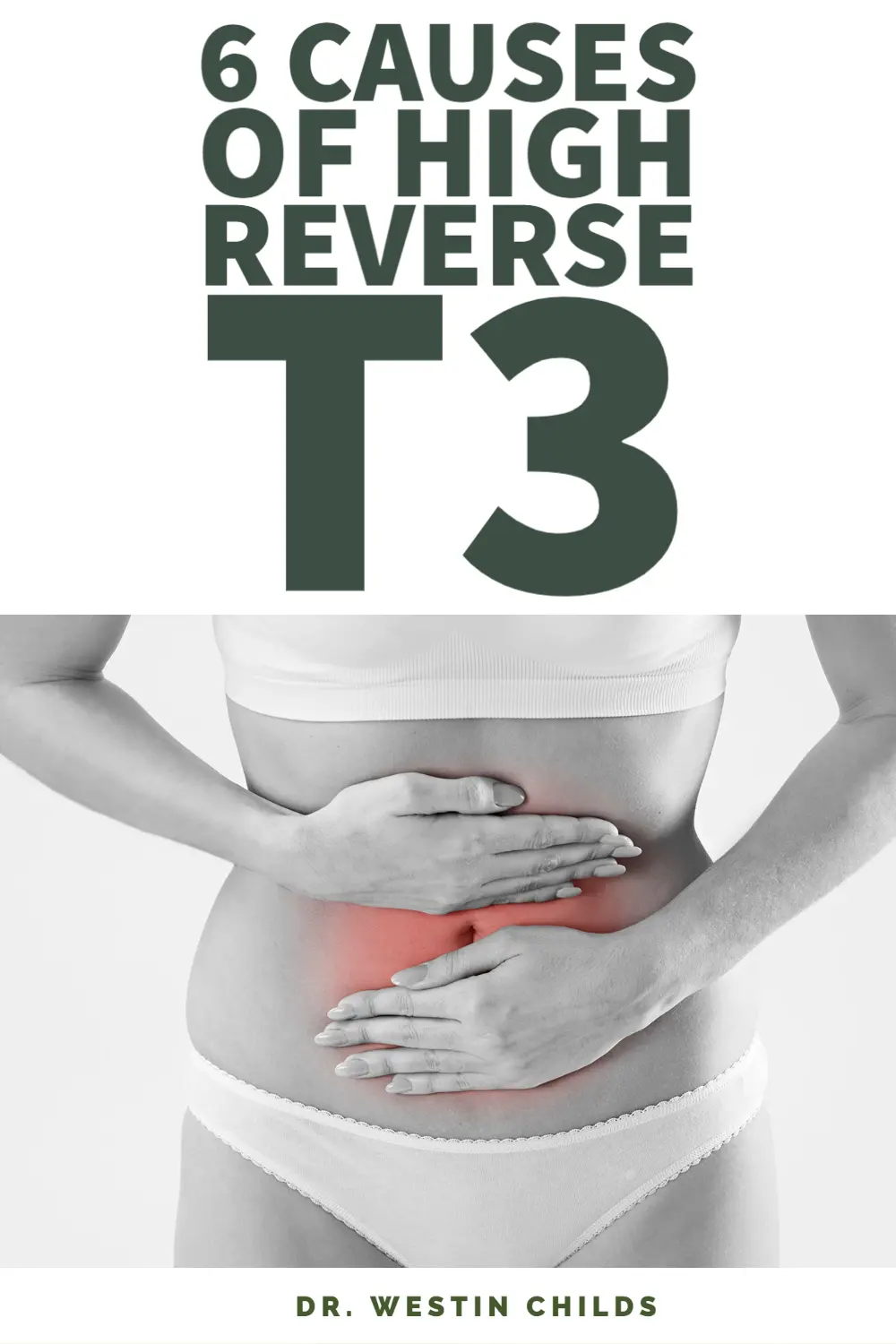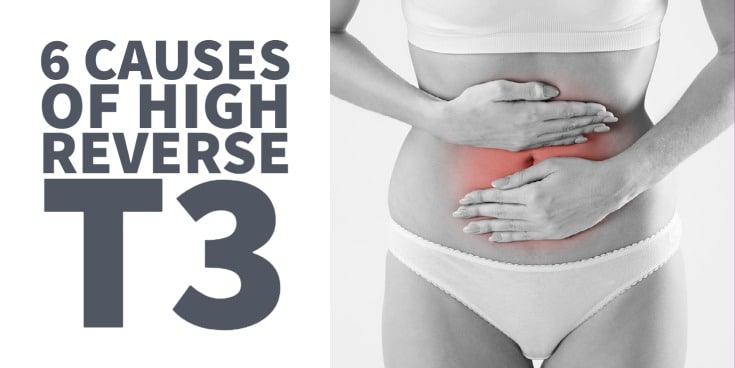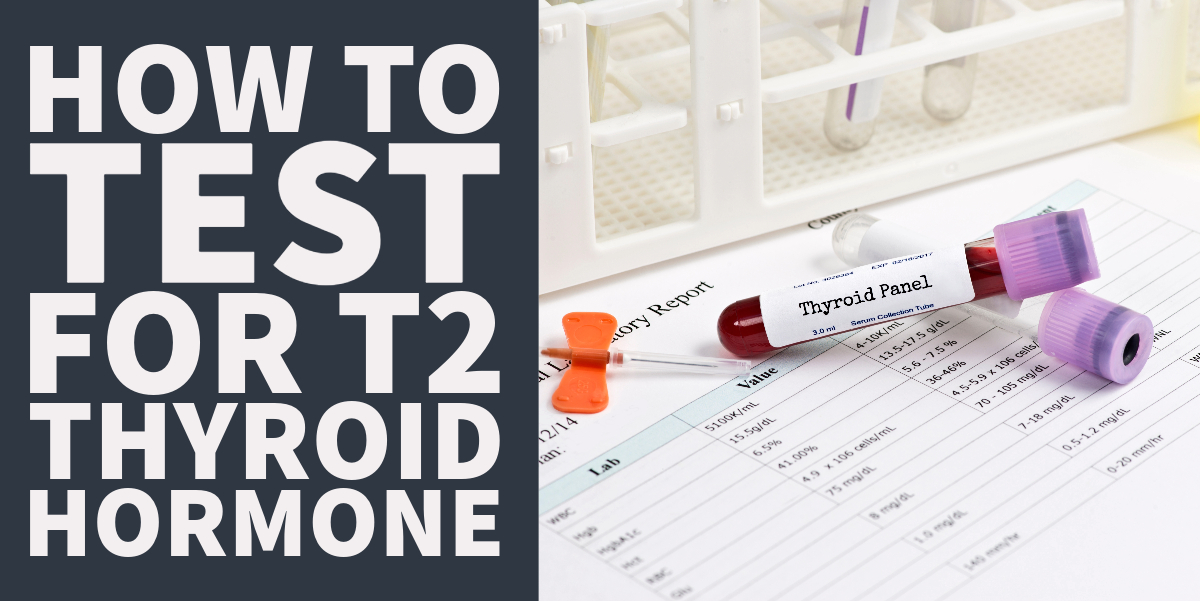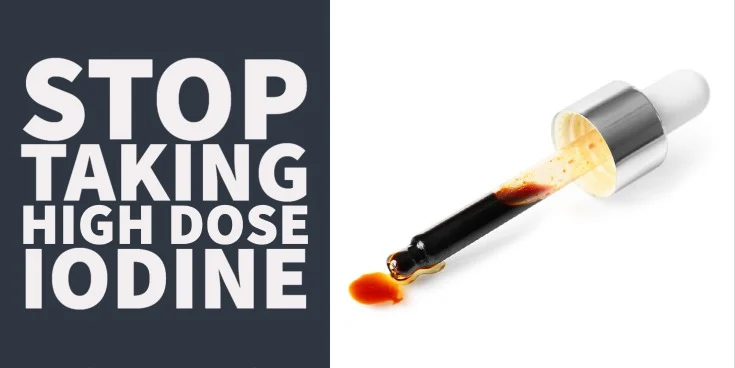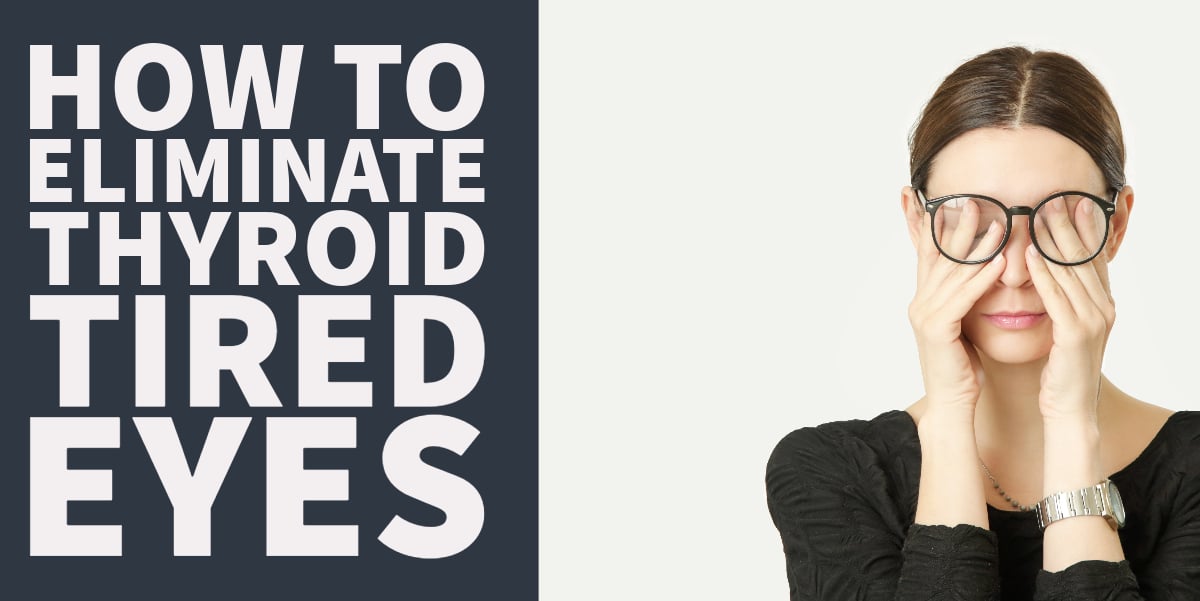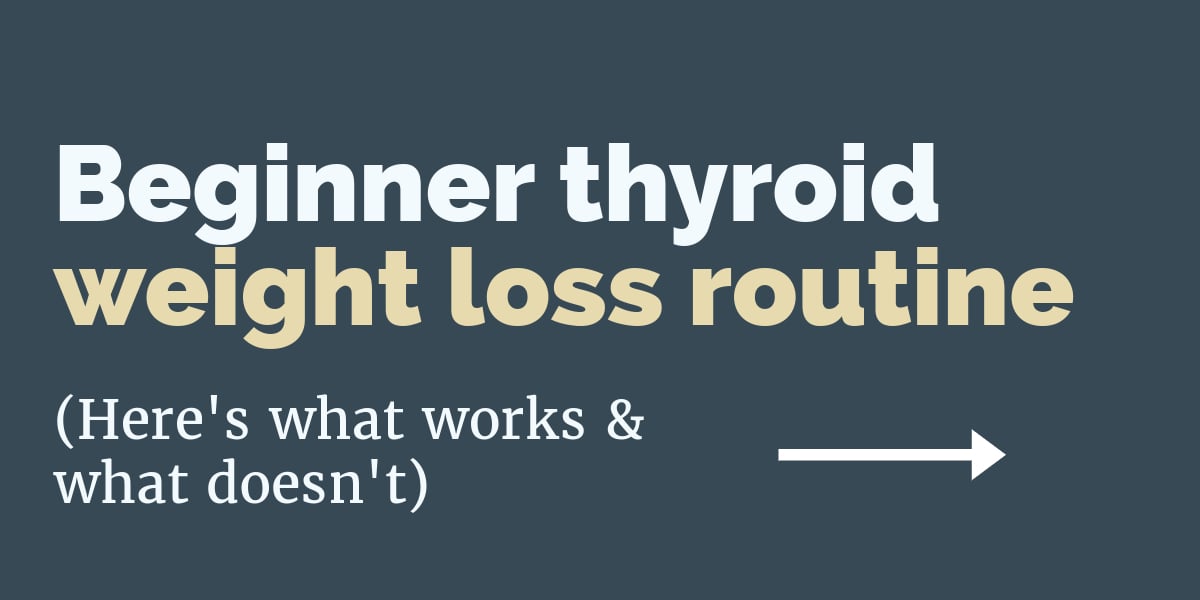If you are new to the world of thyroid problems then something like reverse T3 may be a bit of a conundrum for you.
I know it may seem confusing but we can break it down into very simple terms which will help you understand why this metabolite is so important to your thyroid health (and, therefore, overall health)!
So what is reverse T3?
Reverse T3, sometimes referred to as rT3, is best thought of as an anti-thyroid metabolite.
Meaning that it is something your body creates which is designed to slow down thyroid function.
Why would your body need to slow down thyroid function?
There are actually many (good) reasons why your body might want to do this.
Think about the case of being seriously ill.
Does it make sense for your body to burn excess energy or does it make sense to put more energy into your immune system to help your body fight off infections and recover?
Obviously, it makes sense for your body to put energy into recovery as opposed to building muscle when you are sick.
By altering thyroid conversion as needed, your body can manipulate how much energy it is using (and where that energy is being utilized).
But this assumes that everything is functioning the way it was meant to.
In disordered states, it’s possible for this conversion process to be disrupted which causes serious consequences for thyroid function.
When this happens, you are said to be in a state of high reverse T3 which is exactly what we are going to talk about today.
#1. Dieting and Calorie restriction.
The first, and perhaps the most common cause of high reverse T3, stems from calorie restriction and dieting.
This cause such a common cause because so many thyroid patients struggle with weight gain!
Having a sluggish thyroid (known as hypothyroidism) reduces your metabolism which leads to weight gain.
When this happens, most thyroid patients then try to do what everyone does when they want to lose weight which is cut back on how much food they are eating.
Cutting back on calories may cause a temporary benefit to your weight, but it comes at a big cost:
Decreased thyroid function from metabolic adaption (1).
Metabolic adaptation is used to describe the cost incurred by the body from weight loss efforts.
It’s hotly debated right now how big a role metabolic adaptation plays in post-weight loss weight gain, but it seems clear based on my own experience that it is certainly a problem for thyroid patients.
Ignoring the metabolic adaptation controversy for a second, we know that dieting causes several changes in thyroid function including an increase in reverse T3 and a decrease in free T3.
As a thyroid patient, the more you cut your calories the slower your metabolism will become and the more likely you will be to gain weight once you resume eating a normal amount.
And this entire process seems to be primarily mediated through reverse T3 levels.
I’ve had the opportunity to test thyroid patients and thyroid function at many different times including immediately after intensive weight loss programs.
And I’ve seen the massive spikes in reverse T3 that come as a result of this adaptation process.
The argument can be made that the adaptation process is only temporary and that your thyroid and hormones will return to normal after a set period of time.
And while this is true, it doesn’t happen nearly as fast as you might think.
How long it takes for the body and thyroid to recover from weight loss efforts varies, but some studies suggest it can take several years (2).
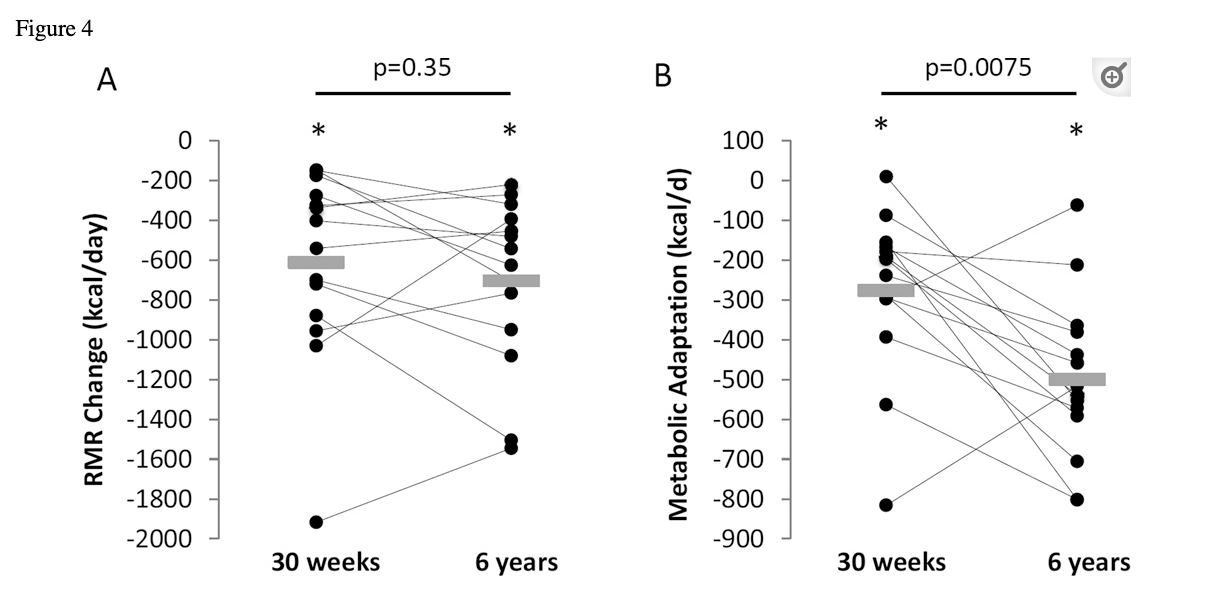
The good news is that all hope is not lost even if you’ve damaged your thyroid and your metabolism with the use of aggressive weight loss treatments.
The first step to losing weight is restoring thyroid function.
This can be done in a number of ways but one of the easiest ways is with the use of thyroid medication.
Simply getting on the right type and dose of thyroid medication is enough to help many thyroid patients lose weight with minimal effort.
This weight loss will most likely not be complete (complete in the sense that you will get back to normal weight), but it should be enough to help you lose 5-20 pounds without changing your diet.
Once you get to this point you can focus on your other hormones, cleaning up your diet (not restricting calories), exercising, managing stress, taking supplements, and so on.
You can learn more about how I help thyroid patients lose weight by balancing their hormones in my weight loss guide.
The bottom line?
Make sure that you avoid all diets that require you to restrict your calories for a prolonged period of time (3 weeks seems to be the cut-off).
And by restriction, I am talking about anything less than around 1,500 calories or so.
If you eat, say, 1,200 calories per day for 4 weeks straight then there is a good chance that you will see a spike in your reverse T3 levels.
Fasting, when done correctly, does not appear to trigger this same response which makes it an ideal alternative to prolonged calorie restriction for thyroid patients.
#2. Inflammation.
Next on the list is inflammation.
Inflammation causes a spike in reverse T3 because it forces your body down the T4 to rT3 pathway (3).
Both systemic (meaning all over your body) and cellular (meaning low-grade inflammation which is harder to test for) can cause this problem.
Most people with inflammation know that they have inflammation because of how they are feeling.
People with inflammation tend to feel fatigued, sore, and achy, have joint pain and suffer from headaches, rashes, and so on.
These non-specific symptoms often indicate that inflammation is present but they don’t necessarily tell you where it is coming from.
Symptoms can go a long way to helping you identify if inflammation is present but it’s also a good idea to get lab tests to confirm.
Two easy tests that can help identify inflammation include the ESR and CRP.
These tests don’t pick up all forms of inflammation but they are a great starting point.

In my experience, one very common cause of inflammation in thyroid patients is food intolerance.
Foods high in sugar, processed foods, and foods made with industrial seed oils are often the culprit.
By cleaning up your diet you should be able to see a reduction in inflammation fairly rapidly if that is the primary cause.
Other treatments can also be considered including the use of anti-inflammatory supplements like fish oil, black seed oil, turmeric, alpha lipoic acid, and so on.
Cooling down inflammation is a quick way to help lower reverse T3 levels and improve thyroid function overall.
#3. Nutrient Deficiencies.
You probably intuitively know that nutrients such as vitamins and minerals are important for your body but maybe you don’t understand exactly why.
These nutrients are used as co-factors to help certain enzymes function in your body.
Remember when I talked about converting T4 into T3?
That conversion process is mediated by certain enzymes called deiodinases (4) and specific vitamins play an important role in helping that process function optimally.
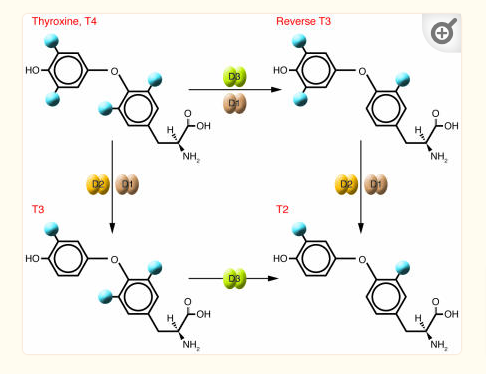
The conversion process will still occur even in the absence of these co-factors, but their absence will slow down its activity considerably.
As deiodinase enzyme activity slows, your body will start to build up reverse T3 levels because it can’t produce T3 efficiently.
The good news is that this provides you with the opportunity to use certain supplements to help augment this process and sort of brute force thyroid conversion in your favor.
The only potentially bad news is that this process really only works if you are deficient in these nutrients, to begin with.
But because most thyroid patients suffer from sub-optimal levels of many nutrients, there’s a good chance that taking them will provide some benefit though that benefit will vary from person to person.
The nutrients and vitamins most important for supporting thyroid conversion include zinc, selenium, vitamin E, and vitamin A.
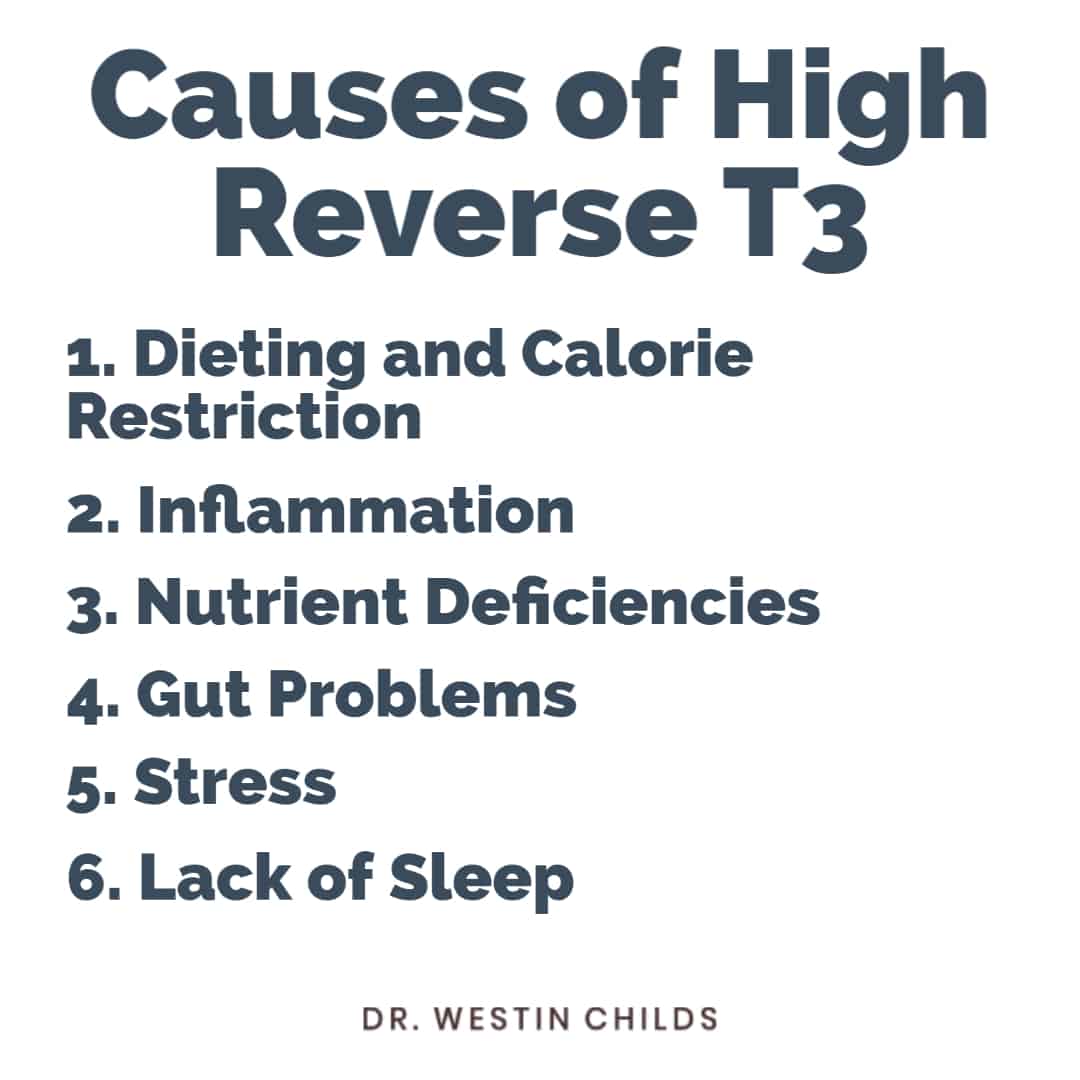
A deficiency in any of these nutrients may diminish how well your body can convert T4 into T3 and increase T4 to rT3 conversion.
This is actually great news.
Why?
Because taking supplements is something that you have control over.
You can make the decision on your own to purchase and use a supplement without the need to get a prescription from your doctor.
We know from studies that taking these nutrients actually helps as well.
For instance, this study (5) showed that taking zinc improves thyroid function in people who are zinc deficient.
And with factors like soil depletion of nutrients and the impact of thyroid function on stomach acid, these nutrient deficiencies are actually quite common among thyroid patients.
This is one of the reasons why I am so passionate about using thyroid support supplements.
I find they are a great way to naturally improve thyroid function and you can learn so much about them by doing your own research.
If you are ready to start using supplements to improve your thyroid you can find some of my recommended products and doses for each below:
- Zinc – 5-10 mg per day
- Selenium – 50 to 150mcg per day
- Vitamin E – 4 capsules per day
- Vitamin A – 12 drops per day
Zinc and selenium tend to help more with T4 to T3 conversion while vitamin A and vitamin E tend to help more with thyroid cellular activity (and sensitivity).
I’ve written about these vitamins (and many others) and why they are so critical to thyroid function here, so if you want a more in-depth look at how supplements can help your thyroid, check out that article.
#4. Intestinal Dysfunction.
Next, we have intestinal dysfunction.
Don’t let the name confuse you.
Intestinal dysfunction refers to any problem with your gut in general.
Usually, this occurs in the context of an imbalance in healthy and unhealthy bacteria in your gut known as intestinal dysbiosis (6).
But it can also occur secondary to inflammation or damage to your gut lining (such as that seen in increased intestinal permeability or leaky gut (7)).

Both conditions result in the same thing:
Increased reverse T3 levels.
How or why does this occur?
Because approximately 20% of all thyroid conversion in your body occurs in your gut (8).
Remember:
Your gut is a huge source of hormones, neurotransmitters, immune activity, and thyroid conversion for the entire body.
Any inflammatory problem (or dysfunction) in this area can compromise any of the previously listed functions including thyroid conversion.
For our discussion, we will focus mostly on thyroid function.
You can imagine that if up to 20% of T4 to T3 conversion occurs in the gut, certain gut problems may limit that percentage and lead to higher reverse T3 levels.
What you may not realize is that pretty much any issue in the gut can cause this problem.
Irritable bowel syndrome, small intestinal bacterial overgrowth, acid reflux, yeast overgrowth (fungal overgrowth), gas, bloating, constipation, diarrhea, and so on.
These are all ‘canaries in the coal mine’ so to speak and their presence may be a reflection of an unhealthy gut.
What’s more, is that these gut problems are much more common among thyroid patients by virtue of how the thyroid influences gut function.
So if you already have thyroid dysfunction (no thyroid, Hashimoto’s, or hypothyroidism) then there is a good chance you are suffering from these gut issues as well.
Treating or addressing these gut issues is paramount if you want to normalize reverse T3 levels.
#5. Stress.
Next up is stress.
And here, I am really talking about stress from any cause.
I probably don’t have to convince you that stress is a bad thing.
We already know that stress can lead to weight gain (9), increase insulin resistance (10), lower testosterone levels (11), cause premature aging (12), etc., etc.
These are obviously things you don’t want to happen in your body.
But we can also add to this list that stress increases your reverse T3 levels and negatively impacts your thyroid (13).
It does this, at least in part, because it impacts cortisol.
Remember:
Cortisol is your stress hormone and it is secreted in times of stress as a compensatory mechanism.
The more stress you are under the higher your cortisol will be and the more it will impact your thyroid function.
For this reason, it is imperative that you do your best to avoid excessive exposure to stress in your day-to-day life.
Some stress is okay and even beneficial, but it can become pathologic when it reaches a certain point (14).
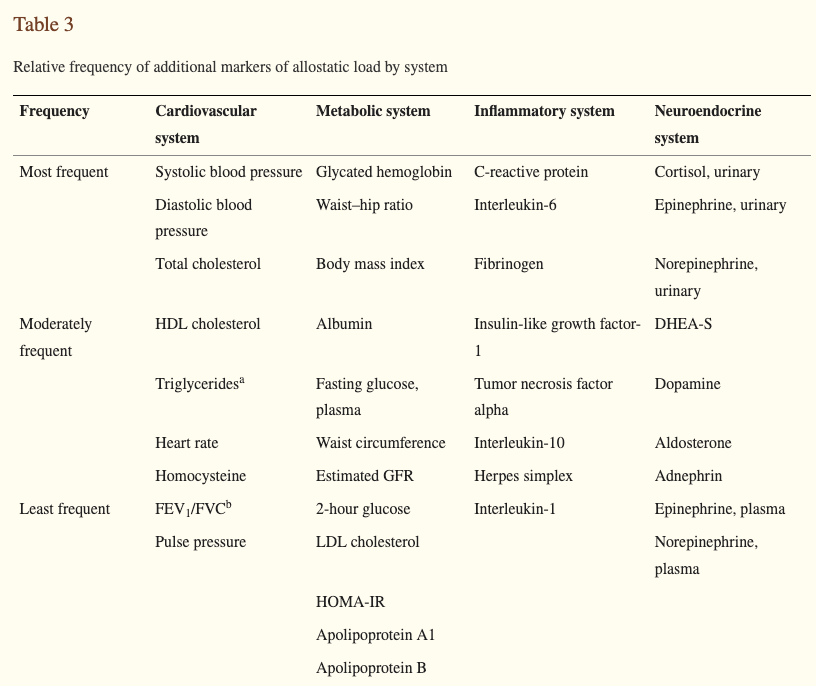
If you can’t eliminate sources of stress then you will need to take steps to improve how resilient your body is to this stress.
You can do this by taking certain supplements such as adrenal adaptogens, using meditation (15) or prayer, eating a healthy diet, supplementing with activated B vitamins, and so on.
If you want to know if stress is impacting your life then make sure you learn more about cortisol testing.
Testing for cortisol is somewhat controversial but it can be helpful in certain situations.
#6. Lack of Sleep.
Last on the list is a lack of sleep!
If you are not sleeping enough then this will drive up your reverse T3 levels (16).

What’s the magic number here?
You should be looking at getting at least 8 hours of quality sleep each night.
Some of you may actually need more than this (I fit into that category) and while some of you may feel ‘fine’ with less that doesn’t mean that your body can actually handle fewer than 8 hours of sleep (17).
So even if you feel ‘fine’ it doesn’t mean that it isn’t negatively affecting you in some way.
If you have an elevated reverse T3 level and you are only sleeping 6 hours per night, for instance, then this might be the sole cause of your high reverse T3 (even if you are otherwise feeling normal).
The number of hours you sleep is important but so is the quality (18).
Make sure you are taking steps to sleep in a cool, quiet, dark environment each night that is free of interruption so that you can sleep soundly each night.
This is very important as well.
Do your best to avoid sleeping aids and sleeping supplements, as well, as these do not necessarily force your body into a restful sleep and in some instances may actually make sleep more difficult long-term.
You can find a list of tips and tricks to naturally improve the quality of your sleep here.
I’ve created this list because I personally struggle with sleeping issues and so it’s always something I’m trying to optimize for myself.
Your Next Steps
The bottom line?
If you are someone who is struggling with thyroid-related issues, then one of the first places you should look is at your reverse T3.
High reverse T3 may explain why some people feel sluggish or hypothyroid despite taking thyroid medication and despite having otherwise ‘normal’ thyroid lab tests.
It’s generally a good idea to get a reverse T3 lab test as part of a complete thyroid lab panel.
Getting this complete panel will help you put all of your labs into context and will help you understand what is happening with T4 to T3 conversion in your body.
If you have a high reverse T3 level your next step is to try and determine the cause.
Use this list above to help you hone down on that issue and then address the problem with the therapies I’ve listed above.
Now I want to hear from you:
Do you have a high reverse T3?
Have you had your reverse T3 level tested before?
If not, are you planning on getting it tested after reading this?
If you do have a high reverse T3 level, what therapies have you tried?
Leave your questions or comments below to keep the conversation going!
Scientific References
#1. pubmed.ncbi.nlm.nih.gov/32386226/
#2. pubmed.ncbi.nlm.nih.gov/27136388/
#3. ncbi.nlm.nih.gov/pmc/articles/PMC3978663/
#4. ncbi.nlm.nih.gov/pmc/articles/PMC1578599/
#5. ncbi.nlm.nih.gov/pubmed/8157857
#6. ncbi.nlm.nih.gov/pmc/articles/PMC4315779/
#7. ncbi.nlm.nih.gov/pmc/articles/PMC7231157/
#8. ncbi.nlm.nih.gov/pubmed/20351569
#9. ncbi.nlm.nih.gov/pmc/articles/PMC2727271/
#10. ncbi.nlm.nih.gov/pmc/articles/PMC9561544/
#11. ncbi.nlm.nih.gov/pmc/articles/PMC6182538/
#12. ncbi.nlm.nih.gov/pmc/articles/PMC7400286/
#13. ncbi.nlm.nih.gov/pmc/articles/PMC3148770/
#14. ncbi.nlm.nih.gov/pmc/articles/PMC6430278/
#15. ncbi.nlm.nih.gov/pmc/articles/PMC4895748/
#16. ncbi.nlm.nih.gov/pmc/articles/PMC8848531/
#17. ncbi.nlm.nih.gov/pmc/articles/PMC4434546/
#18. pubmed.ncbi.nlm.nih.gov/34610163/
